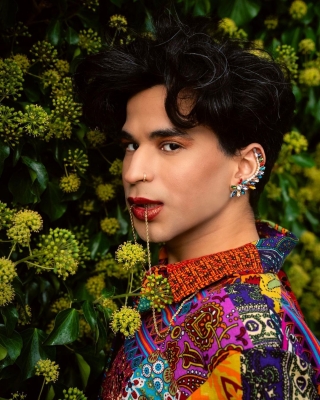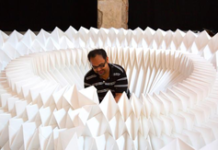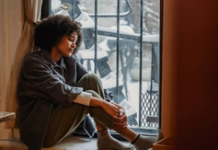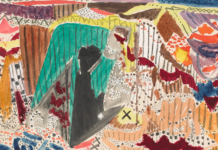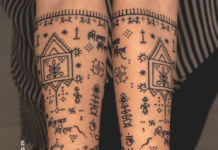By Siddhi Jain
New Delhi– London-based multidisciplinary non-binary performance artist and storyteller Shiva Raichandani, who has been a semi-finalist on ‘Britain’s Got Talent, and has competed on India’s and ‘France’s Got Talent’, says that society should champion, sponsor, and mentor queer artists from a young age in order to support their careers. Raichandani also mentions the need to challenge queerphobia in the performing arts and entertainment spaces.
This month, Raichandani’s was the opening act of the second edition of one of South Asia’s largest virtual celebrations of Pride Month Digital Pride festival, hosted by The Queer Muslim Project ( TQMP) and Instagram. The Festival was supported by British Council, whose Director Arts India Jonathan Kennedy, says that the festival to mark Pride Month shows how we are connected through sharing stories, artistic collaboration, and a sense of international community creating together.
“Our continued association with TQMP is an extension of our work in the arts, where the British Council works to address improved gender equality and support the voices of the LGBTIQ+ creative community to achieve positive recognition. We are hugely encouraged by the stimulating discussions and vibrant performances on Instagram that create deeper connections between artists, activists and audiences during the festival between India and the UK,” says the spokesperson about the Pride festival.
A participant of this and many other Pride-based initiatives, Raichandani harness the power of storytelling to create inclusive spaces for positive gender-diverse representation in media. Excerpts from IANSlife interview:
Q: Please tell us about your beginnings as a performing artist. How challenging was it to make your mark with a non-cisgender-heterenormative identity?
A: Given how gendered Bollywood music and dance can be, it was tricky to navigate those professional spaces that enforced movement within the confines of gender binary. It took a lot of unlearning to accept that I needed to find my own authentic space within entertainment where my dancing was not limited to regressive notions of gender but allowed the expanse and fluidity that the art form represents.
Q: Do you find the performing arts and entertainment space welcome and inclusive enough for people from the LGBTQIA+ community? What can be done to improve it?
A: Not always. We need to de-gender performing arts and entertainments spaces to ensure that they not only are inclusive but safe for gender non-conforming people. Safety is of paramount importance. There is no point in making spaces inclusive of LGBTQIA+ people if we aren’t able to keep them safe. We need to teach and practice dance in a way that allows people to express themselves comfortably without fear of being policed or penalised. We should celebrate queer artists and use them as reference points. We should champion, sponsor, and mentor LGBTQIA+ artists from a young age in order to support their careers. Difference should be celebrated as a way to come together and learn from those lived experiences. We should openly address and challenge the heteropatriarchy in the arts by standing up against queerphobia within these spaces.
Q: What are your thoughts on media representation of gender diversity?
A: Representation must come with accountability. If that representation is not positive, does not contribute to the betterment of LGBTQIA+ lives, and does not support the wider community, then we must be critical of what is being celebrated in the name of visibility. Visibility saves lives, but visibility also takes lives. We need positive gender-diverse imageries and stories of queer people brought to the forefront and that is what I try to do with my work such as the film I’m directing, ‘Queer Parivaar’, an interfaith romantic musical.
Q; Tell us about your IG Live: ‘Dancing Free’ and the Digital Pride Festival supported by British Council. How important is it for cultural institutions to support queer representation and expression?
A: I’m grateful to The Queer Muslim Project and the British Council for hosting me. It was an absolute joy to be part of the wonderful lineup of beautiful artists from across the globe. I’m in awe of how The Queer Muslim Project manages to bring the community together by spotlighting individual stories to relate to and resonate with. Stories have incredible power to shape beliefs, inform culture, and educate the masses; and that’s exactly what the project does through its wide networks. This shows marginalised people that we matter, that our stories matter, and that we’re not alone. I hope other organisations take inspiration from TQMP.
Q: Finally, what do you think has been the pandemic’s impact on the community, specifically, creators, changemakers, and artists?
A: The pandemic wasn’t the kindest to people in live entertainment; we lost our jobs, we lost our income, we were isolated from peers, and we had to rediscover the ways in which we could practice our art forms within the new parameters. However, it has made me a lot more grateful, a lot more humbled, and made me realise that we are a lot more stronger and resilient that we give ourselves credit for. I hope that the pandemic has instilled more empathy in everyone, and I hope that we can get back to creating art in newer and more inclusive ways. (IANS)



